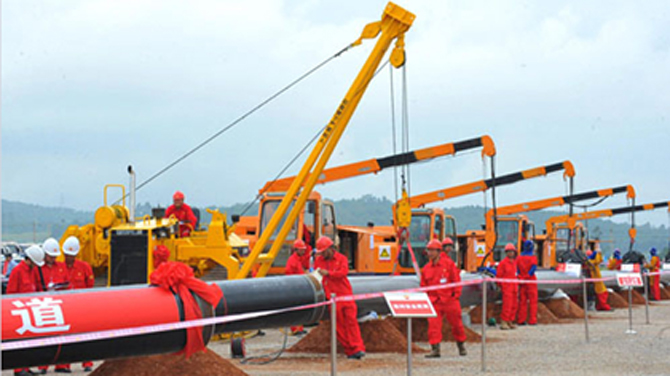Caution Urged on Asia’s New Economic Frontier

The relaxation of the Burmese military’s iron grip on the economic life of Burma has been enthusiastically welcomed by the country’s neighbors, eager to compete with China to tap into what the International Monetary Fund (IMF) terms the “next economic frontier in Asia.”
But big business players in Western countries, notably the oil and gas giants, remain on the sidelines—and not just because economic sanctions are still in place.
Despite the apparent enthusiasm of the IMF, others think a question mark remains over the feasibility of doing business in Burma, drawing comparisons with the one-party corruption of Cambodia and the stifling bureaucracy of Indonesia, where foreign investment is stymied by red tape.
Sean Turnell, a professor of economics at Australia’s Macquarie University and editor of the Burma Economic Watch bulletin, believes Western oil firms will remain reticent to return to Burma any time soon.
“Western energy firms I think are still some time off,” Turnell told The Irrawaddy this week. “US sanctions, even if lifted in part after the [Burmese] by-elections, will still stymie big projects for a bit.
“The natural gas market is in glut at the moment, and given the attendant risks I am not sure they would bother [to enter Burma].”
Gareth Price, of the Royal Institute of International Affairs at Chatham House in London, urges caution by Western countries and big business, warning that there may still be a power struggle in process within the Burmese military which could knock the country’s nascent economic and political reforms off course.
“The military may be attempting to juggle a reduction in its political power with an increase in its economic power,” thinks analyst Price.
“If reformers within Burma’s military are constrained by hardliners, the West should offer early rewards to encourage continued reform. If, however, the lifting of sanctions is the end-point envisaged by the military, the West must be clear on the conditions that need to be met before policy towards Burma is recalibrated.”
These cautious views are in sharp contrast to those of a just-completed IMF fact-finding mission to Burma, which concluded that the isolated Southeast Asian country could be a new frontier for oil, gas and other natural resources development.
“Myanmar [Burma] has a high growth potential and could become the next economic frontier in Asia, if it can turn its rich natural resources, young labor force, and proximity to some of the most dynamic economies in the world, into its advantage,” said the IMF’s Asia and Pacific Department deputy chief, Meral Karasulu.
She forecast that Burma’s economic growth in the current financial year would increase 5.5 percent, led by resources exports and higher foreign investment.
Increased gas exports will be the main driver of fiscal balance in the medium term, she said, citing planned new production at the offshore fields of Shwe and Zawtika.
Shwe, in the Bay of Bengal, is being developed by a South Korean-Indian consortium, while the Thailand firm PTTEP is developing Zawtika in the Gulf of Martaban.
Burma’s Southeast Asian neighbors have been the first to rush to invest since the regime eased controls. Thailand, Malaysia and Singapore firms have won new onshore oil exploration licenses and a Thai construction company has achieved the seemingly glittering prize of developing Burma’s first special economic zone around the sleepy coastal town of Tavoy, now also called Dawei, on the Andaman Sea.
“The Dawei project is clearly backed by the Thai government which sees it as a new route to Indian Ocean markets, as well as offering a convenient relocation for dirty petrochemical industries now facing environmental restrictions inside Thailand,” Bangkok energy industries consultant Collin Reynolds told The Irrawaddy.
“Lots of big-name companies such as the Thai state oil and gas group PTT have been linked with Dawei, but so far there is little firm financial commitment beyond Thai government support for a new cross-border highway and that of the lead contractor, Italian-Thai Development.
“What everyone’s waiting to hear is whether Chinese money will be involved.”
PTT has been linked with proposals for a large refinery and petrochemicals complex within the Dawei economic zone; however, a Chinese firm backed by Beijing state cash is also touting a big new refinery for Burma.
Guangdong Zhenrong Energy Company’s chief executive Xiong Shaohui told Reuters his firm is interested in investing US $2.5 billion in a 100,000 barrels-per-day refinery in Burma, and Dawei is among the possible locations.
1 | 2 next page »
|
||
|
||
- The ‘Virtuous Circle’ of Carrot & Stick Sanctions
- Suu Kyi Curbs Election Campaign After Falling Ill
- Burma Business Roundup (Saturday, March 24)
- Sea Tribunal Ruling: Bangladesh’s Gain, Burma’s Paying
- Burma Business Roundup (Saturday, March 17)
- Floating Toward Honesty: How Burma’s Bent Finances Can Go Straight
- End Near for Burma's Dual Currency Exchange
- Burma Business Roundup (Saturday, March 19)
- Chinese Trade Expo to Focus on Burma
- Dawei Port in Doubt with Bangkok Hub Plan
